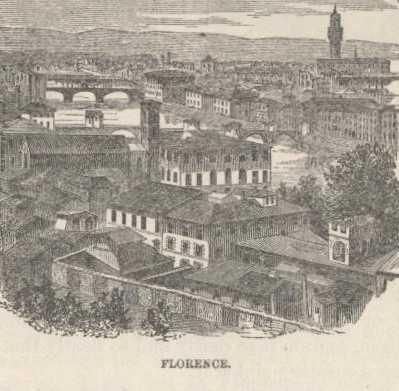Mark Twain's first visit to Italy in 1867, before its political unification. Italy had been under foreign domination but following the Napoleonic Wars movements for independence and unification began. The first wave, led by Garibaldi and others created the kingship of Italy in 1861. Venetia was added in in 1866 and Rome in 1870. The Quaker City first made port in Genoa followed by landings in Leghorn and Naples. Twain toured several other cities, mostly by train. These included Milan, Como, Venice, Florence, Pisa and Rome. Twain's adventures in Italy are presented in chapter 17 to 31 of The Innocents Abroad Genoa,
Italy, July 14.
Dear Folks— I am just on the eve of starting on a month’s trip to Milan, Padua, Verona, Venice & Rome, & shall rejoin the ship at Naples on the 9th of August.
I wrote you from Paris & Marseilles, but wrote little. It seems to me I have no time to do anything. We are rushing constantly. Since we touched dry land we have gone to bed after [midnight ]& rose again at 7 to rush all day. I cannot even get a chance to write newspaper letters regularly—but such as they are you must take them as home letters.
We tired ourselves out here in this curious old city of palaces yesterday & shall again [to-day]. We may possibly leave here at daylight tomorrow morning.3 The city has 120,000 inhabitants & ⅔ of them are women & the most beautiful one can imagine[.] We a And they are the most tastefully dressed & the most graceful. We sat in a great [gas-lit ]public grove or garden till 10 last night, where they were crowded together drinking wine & eating ices, & it seems to me that it would be [goo[d] ]to die & go there.
These people think a good deal [ [of] ] Columbus, now, but they didn’t [formerly[.] ]
Yrs aff. Sam.
Over the next two and a half weeks, Clemens, Jackson, and Slote stopped a day or two each in Milan, Bellagio on Lake Como, Venice, Florence, and Rome. They passed through, but did not stop in, Padua and Venora. On or about the evening of 25 July, after traveling from Florence with a brief stop in Pisa, they rejoined the Quaker City at Leghorn. Because the ship was expected to be put in quarantine at Naples, its next stop, they left it again the following morning and sailed for Civitavecchia on a French steamer. From there they took a train to Rome. Upon their arrival in Naples about 1 August, the same day the Quaker City arrived there, they took rooms in the city while the ship waited out its quarantine. The Quaker City sailed from Naples on the morning of 11 August.
SLC to Jane Lampton Clemens and Family, 15 July 1867, Genoa, Italy (UCCL 00141), n. 1.
